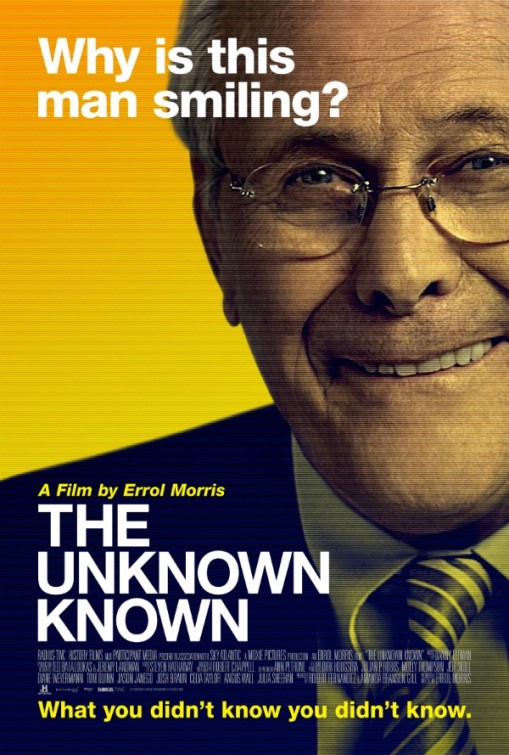
Filmmaker Errol Morris has said of his interview with former U.S. Secretary of Defense Donald Rumsfeld that it was one of the strangest interviews he’s ever done. The 2013 documentary The Unknown Known explores this conversation and effectively proves Morris right by focusing on his subject’s effusive predisposition to “muddy the waters.”
Rumsfeld is not a clarifier. It stands to reason that Morris constantly uses the motif of the open water to express the man’s tendency to send people afloat on oceans of words. At one point, the water even fills with scraps of Rumsfeld’s memos. There are apparently some 20,000 of the things from his tenure under George W. Bush alone. They’re called “snowflakes.”
The Unknown Known largely focuses on the truth Rumsfeld has told to himself over the years. It’s fascinating to note how his beliefs about issues like Iraq and the “torture memos” have not been undermined by little inconveniences like “facts” or “reality.” Morris starts with the conception of the “unknown known” and works back in time.
This means that the documentary tracks Rumsfeld from when he resigned from Congress in 1969 to serve Nixon to when he “resigned” from the Bush administration in 2006. It focuses on the prisoner-abuse scandals, on 9/11, on Vietnam, and on his meeting with Saddam Hussein in December of 1983. All the while, Rumsfeld is energetic and perhaps surprisingly non-confrontational.
Rumsfeld, for all his insistence that he has no idea why he’s talking to Morris, seems more than happy to serve up plate after plate of word salad. It stands to reason that his memoir from 2011 would be called Known and Unknown because these sorts of contortions have served him well.
The conception that there are “things we do not know we don’t know” is only half the battle in The Unknown Known. For Morris, the other half of the battle is the hunt. This isn’t a super-debate or a dynamic confrontation. Some may even be disappointed with how little political meat it reveals and some will be peeved that it humanizes such a figure.
But it does because Rumsfeld is a human being after all. His use of semantics is the stuff of legend and his smile, ever-present in The Unknown Known, may well be on its way to stardom. There is such an off-putting, bizarre air to the former Secretary’s grin. It covers all manner of sins: “That one may smile, and smile, and be a villain” as Shakespeare would have it.
Is Donald Rumsfeld a villain? That depends on where you sit. Morris doesn’t set out to paste any sort of label on the man and that’s to his credit as a filmmaker. He instead allows his subject to sift through his own snowflakes, sometimes burying himself in verbiage and sometimes cutting to the chase. All the while, abstractions are always part of the game.
Rumsfeld is very interested in the phrasing of things, in how concepts can be described. This seems to interest him more than facts. When Morris asks him a direct question about the torture memos, Rumsfeld takes issue with the number of memos and, in his mind at least, puts a different spin on the query.
The Unknown Known, like the sublime The Fog of War, makes great use of Morris’ unflinching camera. It’s tempting to compare Rumsfeld’s appearance here with that of Robert McNamara in the aforementioned 2003 documentary, but there’s less wonder about the former’s choices. All Rumsfeld is willing to concede is that “time will tell” as to the morality of the decisions he helped carve into history.
Morris’ subject is constantly in a state of wonder as to how things can take turns. He doesn’t claim to anticipate much and has no problems with doubt. He has no problem not knowing – or so it would seem – and that makes The Unknown Known all the more compelling. What’s interesting here isn’t showy. It’s in the elusive twisting Rumsfeld’s mind does to achieve his ends.
The Blu-ray release of The Unknown Known, along with the DVD, features commentary by Morris along with a featurette from the filmmaker that explores some of his conceptions about Rumsfeld. There’s also the text of Morris’ four-part op-ed The Certainty of Donald Rumsfeld and the Third Annual Report of the Secretaries of Defense from 1989 for reference and further context.